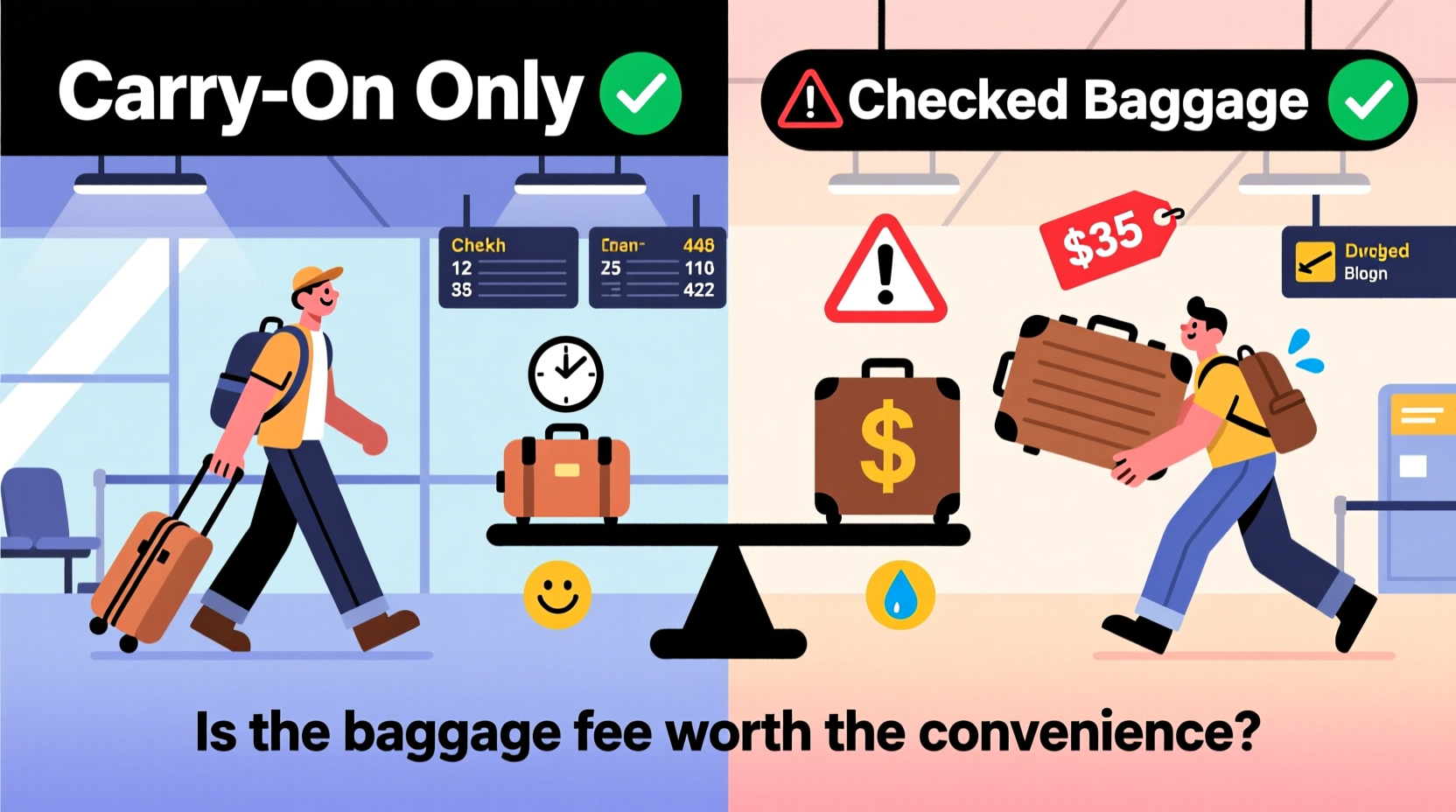Traveling should be about discovery, not decisions that drain your wallet or patience. Yet one of the most common dilemmas flyers face isn’t about destinations—it’s about luggage. Should you pay the baggage fee to check a suitcase, or go carry-on only and save the cost? The answer depends on more than just price. It involves time, comfort, destination, travel frequency, and personal priorities.
For some, the ability to pack freely and walk straight off the plane without waiting at baggage claim is priceless. For others, every dollar counts, and the idea of paying $35–$60 extra per flight for a checked bag feels like a rip-off. This article breaks down both sides with real-world insights, cost comparisons, and practical strategies so you can make an informed choice—every time you book a flight.
The Real Cost of Checked Baggage

Airline baggage fees have climbed steadily over the past decade. Most major U.S. carriers charge between $35 and $40 for the first checked bag on domestic flights, with second bags often costing even more. International routes may include one free checked bag, but budget airlines like Spirit, Frontier, and Ryanair charge for even small suitcases at the gate.
Consider this: a round-trip flight for two people with one checked bag each could add $160 to the base fare. That’s equivalent to a hotel night or several meals. And if you're traveling with kids or for extended stays, those costs multiply quickly.
But here's the catch—many travelers overlook hidden costs on the carry-on side. Rushing to repack at the airport, buying toiletries after security, or paying overweight carry-on fees (yes, they exist) can quietly erase savings. Some ultra-low-cost carriers even charge more for carry-ons stored in overhead bins than for checked luggage.
Convenience Factor: Time, Stress, and Flexibility
Checking a bag isn’t just about cost; it’s about convenience. When you check luggage, you trade money for ease. You arrive at the airport less stressed, knowing you don’t need to compress weeks’ worth of clothing into a 22-inch roller. You can bring souvenirs home without worrying about fitting them into a tight overhead bin.
On arrival, however, that convenience comes with risk. Delays, misrouting, and lost luggage still happen. According to DOT data, airlines mishandled approximately 4.5 bags per 1,000 passengers in recent years. While most are recovered within 48 hours, arriving without your essentials—especially on business trips or international vacations—can derail plans.
Carry-on travelers skip baggage claim entirely. They’re often out of the airport faster, especially on short-haul flights. There’s no waiting, no tracking number, no anxiety about whether your bag made the connection. But this speed comes with trade-offs: limited packing space, stricter liquid rules, and the physical burden of carrying everything yourself—through terminals, up escalators, and onto shuttles.
“Time is the most valuable currency in travel. For frequent flyers, avoiding baggage claim can save hundreds of hours annually.” — Mark Tran, Travel Efficiency Consultant
When Checking a Bag Makes Sense
Not all trips are created equal. Certain scenarios tilt the balance clearly toward checking luggage—even with the fee.
- Long trips (7+ days): Packing week’s worth of outfits, shoes, and toiletries into a carry-on requires expert-level rolling and editing.
- Cold-weather destinations: Bulky coats, boots, and layers are hard to fit overhead and uncomfortable to wear through security.
- Business travel with formal wear: Suits, dresses, and delicate fabrics benefit from garment bags and flat storage in cargo holds.
- Families with young children: Diapers, formula, toys, and extra clothes make carry-ons impractical.
- Returning with purchases: Shopping abroad or bringing back gifts often exceeds carry-on capacity.
In these cases, the $40 fee buys peace of mind, reduces physical strain, and allows for a more comfortable travel experience.
When Carry-On Only Wins
Going carry-on only isn’t just for minimalist backpackers. It’s a smart strategy when speed, simplicity, and savings matter most.
Short weekend getaways, warm-weather trips, or visits to cities with easy laundry access are ideal for carry-on travel. With strategic packing, you can fit a week’s wardrobe in a single bag using compression cubes, roll techniques, and capsule wardrobes.
Ultra-light travelers often report feeling more agile and less encumbered. Without checking a bag, there’s no risk of loss, no extra airport lines, and no need to rush to check in early. Many also find that limiting their belongings leads to more intentional travel—bringing only what they truly need.
| Factor | Checked Bag | Carry-On Only |
|---|---|---|
| Cost (Domestic, one way) | $35–$60+ | $0 (if policy allows) |
| Packing Flexibility | High | Low to Moderate |
| Arrival Speed | Slower (baggage wait) | Faster (walk off plane) |
| Risk of Lost Luggage | Moderate | None |
| Physical Burden | Lower (bag handled by airline) | Higher (self-carry throughout) |
| Ideal Trip Length | 7+ days | 1–5 days |
Real Traveler Scenario: A Week in Europe
Sophie, a marketing consultant from Chicago, recently took a seven-day trip to Paris and Rome. She debated checking a bag versus carry-on only. Her initial plan was to pack light, but she needed professional attire for client meetings, walking shoes, a jacket for cooler evenings, and space for souvenirs.
She opted to check a bag, paying $60 round-trip. At departure, she breezed through security without juggling multiple items. In Paris, she wore her coat comfortably instead of stuffing it in her carry-on. After shopping in Florence, she packed wine, ceramics, and a leather journal without stress.
On her return, her bag was delayed by three hours due to a routing error. She had to buy deodorant and socks at the airport—but because she kept essentials in her carry-on, she wasn’t stranded.
“Worth it,” she said. “I saved mental energy and arrived ready for work. Next time, I’ll just pack a change of underwear in my personal item to be safer.”
How to Decide: A Step-by-Step Guide
Instead of guessing, use this decision framework before every trip:
- Determine trip length and purpose. Business, vacation, family visit? More than five days usually favors checking a bag.
- Assess destination climate. Cold, variable, or rainy weather increases bulk—hard to manage in carry-ons.
- Review airline baggage policy. Check fees, weight limits, and whether your fare class includes free checked bags (e.g., Delta Comfort+, United Premium Plus).
- Calculate total cost. Multiply baggage fees by travelers and legs. Is $120 for two bags worth the convenience?
- Evaluate risk tolerance. Can you handle a delayed bag? If not, consider carry-on or shipping essentials ahead.
- Test pack your carry-on. Try fitting everything in your intended bag. If it’s overstuffed or heavy, checking may be smarter.
- Plan for return items. Will you shop? Bring gifts? That extra space matters.
Expert Tips for Maximizing Carry-On Efficiency
You don’t have to sacrifice comfort to avoid baggage fees. Smart packing can stretch carry-on limits significantly.
- Roll, don’t fold: Rolling clothes saves space and reduces wrinkles.
- Use packing cubes: Compress outfits and separate clean/dirty items.
- Wear bulky items on the plane: Jackets, boots, and sweaters take up the most space—wear them during transit.
- Limit shoes to one pair: Choose versatile footwear. Pack flats or sandals that flatten easily.
- Buy toiletries locally: Purchase shampoo, toothpaste, and sunscreen upon arrival—especially if staying in an Airbnb or hotel with kitchens.
- Choose wrinkle-resistant fabrics: Merino wool, polyester blends, and travel-specific clothing reduce the need for multiple outfits.
When Airlines Make the Choice for You
Some carriers force the issue. Budget airlines like Spirit and Frontier charge for both checked and carry-on bags unless you pay for \"priority\" boarding. On these flights, checking a bag might actually be cheaper than bringing it onboard.
Meanwhile, full-service airlines like JetBlue allow one free checked bag on many fares, making checking a no-brainer for eligible travelers. Always compare total trip cost—including baggage—when booking.
Also note: oversize or overweight carry-ons caught at the gate can incur fees equal to or higher than checked bags. Airlines are cracking down on passengers who bring large suitcases but lack priority boarding. If your bag doesn’t fit the sizer, you’ll pay to check it last minute—often at a premium.
FAQ: Common Questions About Baggage Decisions
Do any credit cards cover baggage fees?
Yes. Premium travel cards like the Chase Sapphire Preferred, United Quest Card, and Delta SkyMiles Reserve offer annual credits or automatic waivers for checked bags (typically one free bag per flight). Always confirm benefits before booking.
Can I bring two carry-ons?
Most airlines allow one standard carry-on plus one personal item (purse, laptop bag, backpack). As long as both fit size requirements and you board early enough, you can bring both onboard. However, basic economy passengers on some airlines may have restricted carry-on privileges.
What happens if my carry-on is too heavy?
Airlines rarely weigh carry-ons, but they do enforce size. However, if a bag appears excessively heavy or damages bins, staff may require weighing. Excess weight fees vary but can range from $50–$150 depending on the carrier and route.
Final Verdict: Is the Baggage Fee Worth It?
There’s no universal answer. For short, warm-weather trips with minimal needs, carry-on only is often the smarter, cheaper, and faster option. The savings add up, especially for frequent travelers, and the reduced hassle is real.
But for longer stays, colder climates, or trips involving shopping or formal events, paying the baggage fee frequently pays for itself in comfort, flexibility, and peace of mind. The key is intentionality: assess each trip individually, factor in all costs and risks, and pack accordingly.
Smart travelers don’t default to one method—they adapt. They know when to splurge on a checked bag and when to embrace the freedom of carry-on life. They use tools like packing lists, airline apps, and credit card perks to stay ahead.









 浙公网安备
33010002000092号
浙公网安备
33010002000092号 浙B2-20120091-4
浙B2-20120091-4
Comments
No comments yet. Why don't you start the discussion?